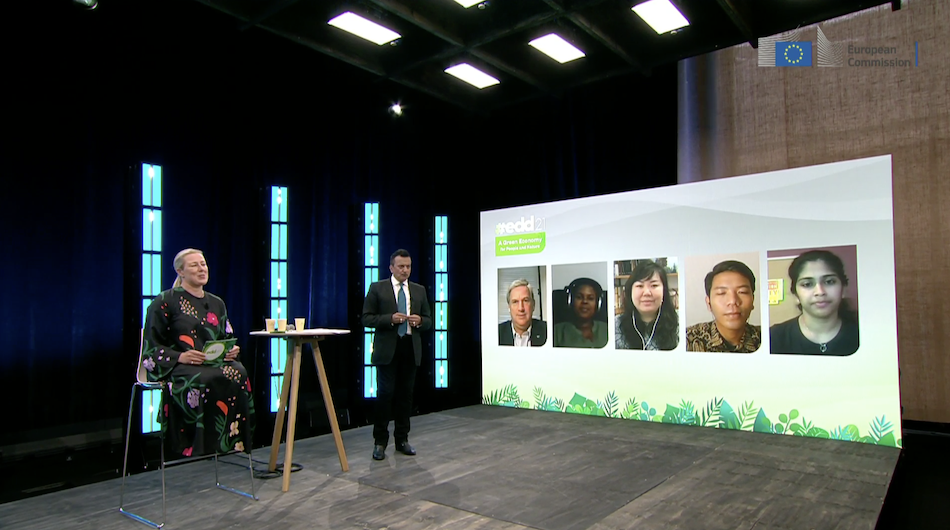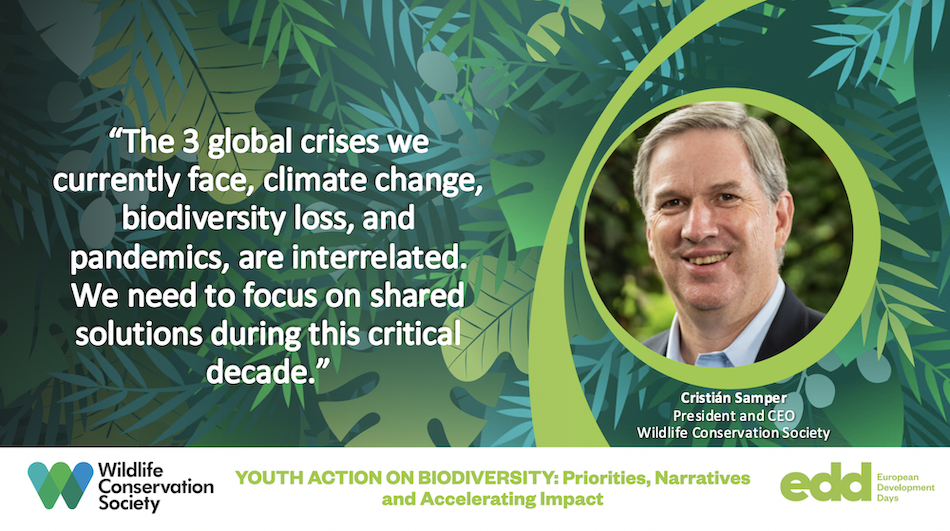The health of ecosystems on which we and all species depend is deteriorating more rapidly than ever. We are eroding the very foundations of our economies, livelihoods, food security, health and quality of life worldwide. Yet a different future is possible, the solutions to reversing these trends lie notably among those who will be most affected by them – young people. A new generation of young people and ecopreneurs has emerged and is putting the planet’s health first.
In this special session held on 15th June 2021, panelists, including EU Commissioner Jutta Urpilainen, Cristián Samper President and CEO of WCS, and many young leaders, discussed youth’s engagement and expectations.

Ms. Jutta Urpilainen, EU Commissioner for International Partnerships, stressed that young people are the driving force in finding innovative solutions to address climate change and biodiversity loss, and that it was critical to earn the trust of young people. 91% of young Africans and Europeans have stated that they want to be involved in more decision-making processes. In this regard, the EU Commission is preparing a youth action plan that will allow a more coordinated approach to have youth included in EU policy-making. Commissioner Urpilainen also highlighted the importance to mobilise more funds, and ensure better governance and regulations in biodiversity conservation.
Ms. Simangele Msweli, Senior Manager at the African Wildlife Foundation, stated that once we recognize the need to restore and protect ecosystems, there is a need to invest in people to give them the skills to accomplish these goals. She also emphasised that scarce financial resources have undermined the success of strategic biodiversity plans and that there is a need to increase accessibility to funds especially for developing nations.
Ms. Swetha Stotra Bhashyam, Global South Focal Point at the Global Youth Biodiversity Network, highlighted the need to change our education systems and shifting culture across the globe. According to her, transformative education will lead us towards living in harmony with nature. Her vision for the future is one that is equitable, sustainable, just and inclusive.
Mr. Hamid Arrum Harahap, Youth Leader Climate Change of Indonesia, UNESCO and EDD Young Leader, focused his intervention on ecosystem and biodiversity conservation, presenting the case of the Endangered Tapanuli orangutan, the links with loss of ecosystems, and the role of palm oil and hydro dams. He also highlighted the need to listen to the local knowledge and understand the local context.
Ms. Melina Sakiyama, Founding Member of the Global Youth Biodiversity Network, highlighted that we live in a very asymmetric society with power imbalances and that resources are not getting where they need to get. According to her, funding gets lost in the system rather than reaching the communities directly.
Dr. Cristián Samper, President and CEO of the Wildlife Conservation Society, highlighted that the three global crises we currently face, climate change, biodiversity loss, and pandemics, are interrelated, and that we need to focus on shared solutions during this critical decade. In particular, he pointed out that pandemics of zoonotic origin are directly tied to wildlife trade and the increase in the human-wildlife interface caused by deforestation and forest degradation. He also noted that more than a third of the solution to climate mitigation can come from nature-based solutions. Dr. Samper concluded by re-emphasizing the importance of partnerships, funding, building capacity, and empowering young people in addressing theses global crises.
